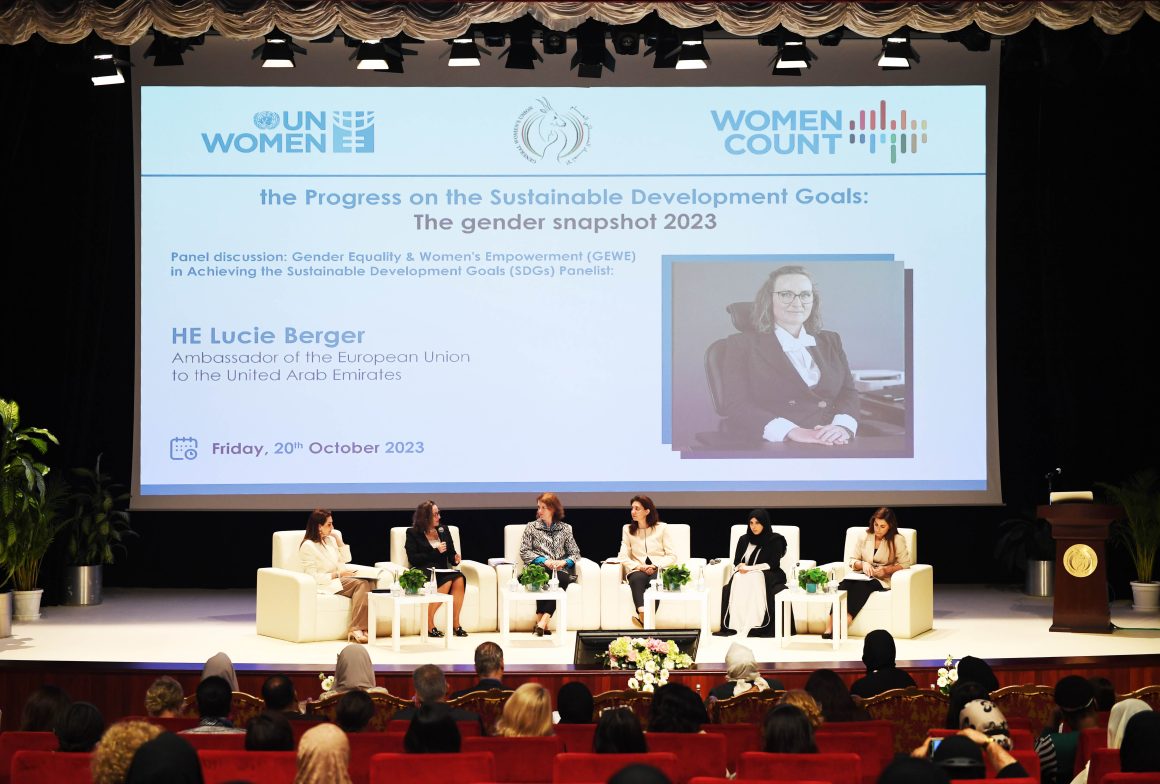Under the patronage of H.H. Sheikha Fatima bint Mubarak, Chairwoman of the General Women’s Union (GWU), President of the Supreme Council for Motherhood and Childhood, and Supreme Chairwoman of the Family Development Foundation (FDF), the “Mother of the Nation,” the GWU today hosted an event to launch The Progress on the Sustainable Development Goals: The Gender Snapshot 2023, drafted by the United Nations Entity for Gender Equality and the Empowerment of Women (UN Women) and the United Nations Department of Economic and Social Affairs (DESA), in cooperation with the GWU.
On the occasion, H.H. Sheikha Fatima said, “The UAE has always valued gender balance as more than just a moral, humanitarian and legal right. It has been the foundation and inspiration of our principles, following the vision and wisdom of the late founder of the nation, Sheikh Zayed bin Sultan Al Nahyan. The wise leadership has continued this legacy, so we see women in all vital roles: leaders, decision-makers, and role models for their families and society.”
In her speech, which was delivered on her behalf by Reem Al Falasi, Secretary-General of the Supreme Council for Motherhood and Childhood, Sheikha Fatima expressed her pride in the UAE’s achievements in gender balance, which has become a global priority.
The UAE has made remarkable progress in bridging gender gaps and establishing itself as a model for the best practices in this field, she added, highlighting the UAE’s contributions to the international efforts to support and empower women and girls, in line with the fifth goal of the Sustainable Development Goals, she added.
“These local, regional, and international achievements were realised due to the unlimited support of the UAE’s leadership, led by President His Highness Sheikh Mohamed bin Zayed Al Nahyan, and His Highness Sheikh Mohammed bin Rashid Al Maktoum, Vice Presidentand Prime Minister of the UAE and Ruler of Dubai, and His Highness Sheikh Mansour bin Zayed Al Nahyan, Vice President, Deputy Prime Minister and Chairman of the Presidential Court, and Their Highnesses Supreme Council Members and Rulers of the Emirates, as well as the significant efforts of the GWU since its inception to champion women’s rights and support women empowerment efforts,” Sheikha Fatima said.
“We believe in the importance of the global women’s empowerment efforts. Therefore, we collaborate with our international strategic partners, most notably UN Women, to support underprivileged women,” she further added.
Sheikha Dr. Moza bint Tahnoon Al Nahyan, Advisor at the Ministry of Foreign Affairs, attended the report’s launch.
Mona Al Marri, Vice President of the UAE Gender Balance Council, expressed her pride in the UAE’s outstanding progress in gender balance and its leading stature in global reports and indicators.
She attributed this fact to the generous patronage of Sheikha Fatima for women and the unwavering support of the UAE’s leadership, as well as Sheikha Fatima’s global initiatives to empower women and increase their contributions to the nation’s development, in line with the vision of the late Sheikh Zayed, who championed women’s rights, as well as the UAE’s commitment to the Sustainable Development Goals for 2033, which the country was among the first to adopt and update.
Dr. Mouza Al-Shehhi, Director of the UN Women-UAE Liaison Office for the GCC, said: The report constitutes a guide and roadmap for change.”
Cooperation among all members of society is crucial to ensuring progress and sustainable prosperity, she added.
Dr. Moez Doraid, Acting Deputy Director of UN Women, said: ‘’This year’s report is a call to action, and we know that we need to make serious efforts to implement the promises we made for women and girls under the 2030 Sustainable Development Goals.”
The Progress on the Sustainable Development Goals: The Gender Snapshot 2023 provides a comprehensive analysis of the current state of gender equality across all 17 Sustainable Development Goals (SDGs) and highlights prevailing trends, gaps, and recent setbacks on the journey towards achieving gender equality by 2030. The report paints a worrisome picture. Halfway to 2030, progress on SDG 5 – Gender Equality – is clearly way off track, with only two Goal 5 indicators being “close to target” and no SDG 5 indicator at the “target met or almost met” level.
The annual publication warns that, if current trends continue, over 340 million women and girls – an estimated 8 per cent of the world’s female population – will live in extreme poverty by 2030, and close to one in four will experience moderate or severe food insecurity. The gender gap in power and leadership positions remains entrenched and, at the current rate of progress, the next generation of women will still spend on average 2.3 more hours per day on unpaid care and domestic work than men. This year’s report includes sex-disaggregated data on the intersections of gender and climate change for the first time, and projects that by mid-century, under a worst-case climate scenario, climate change may push up to 158.3 million more women and girls into poverty (16 million more than the total number of men and boys).
The Gender Snapshot 2023 underscores the urgent need for concrete efforts to accelerate progress towards gender equality by 2030, revealing that an additional $360 billion per year is needed to achieve gender equality and women’s empowerment across key global goals. The report also includes calls for an integrated and holistic approach, greater collaboration among stakeholders, sustained funding, and policy actions to address gender disparities and empower women and girls worldwide, concluding that failure to prioritize gender equality now could jeopardize the entire 2030 Agenda for Sustainable Development.
WAM

